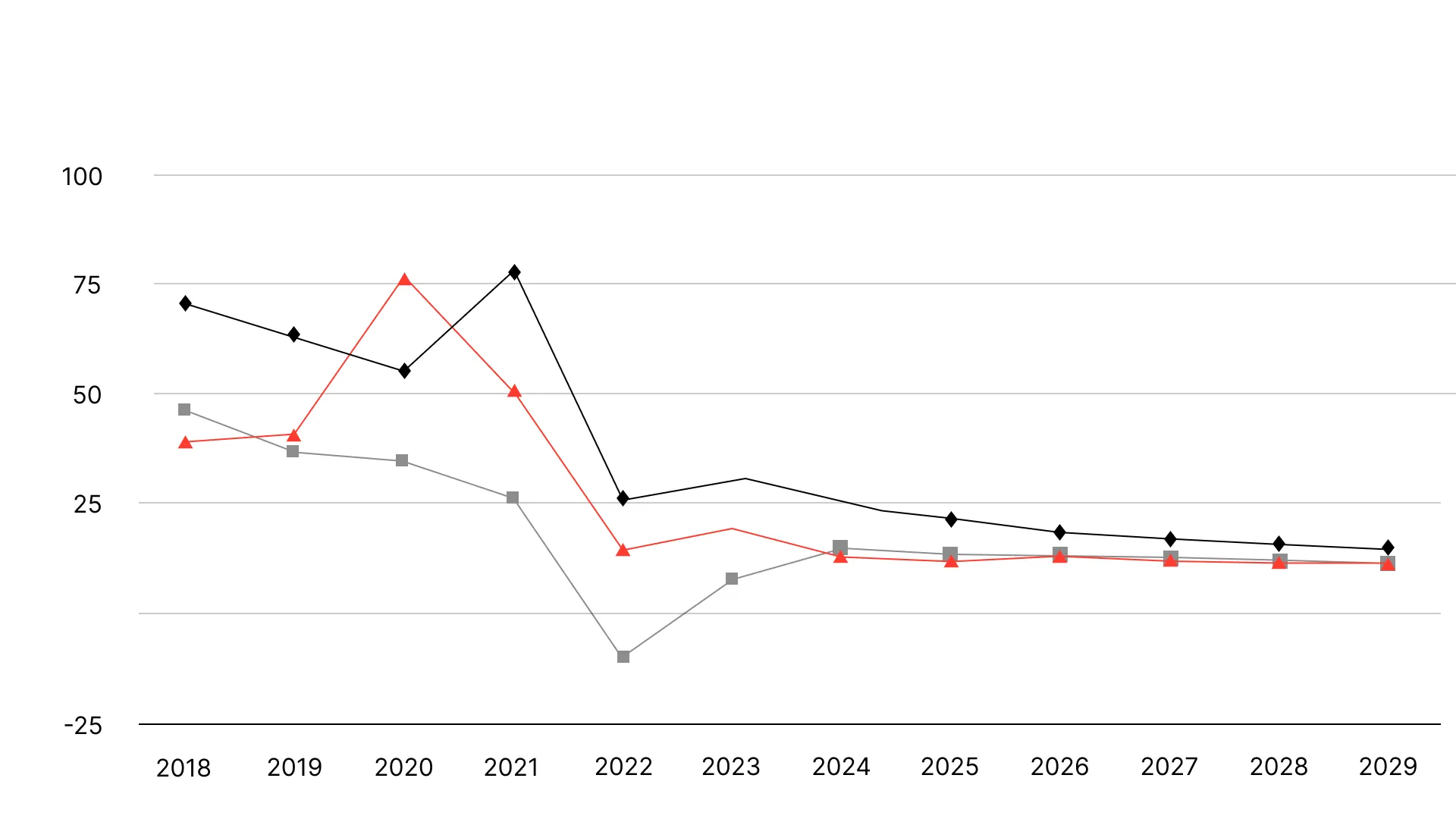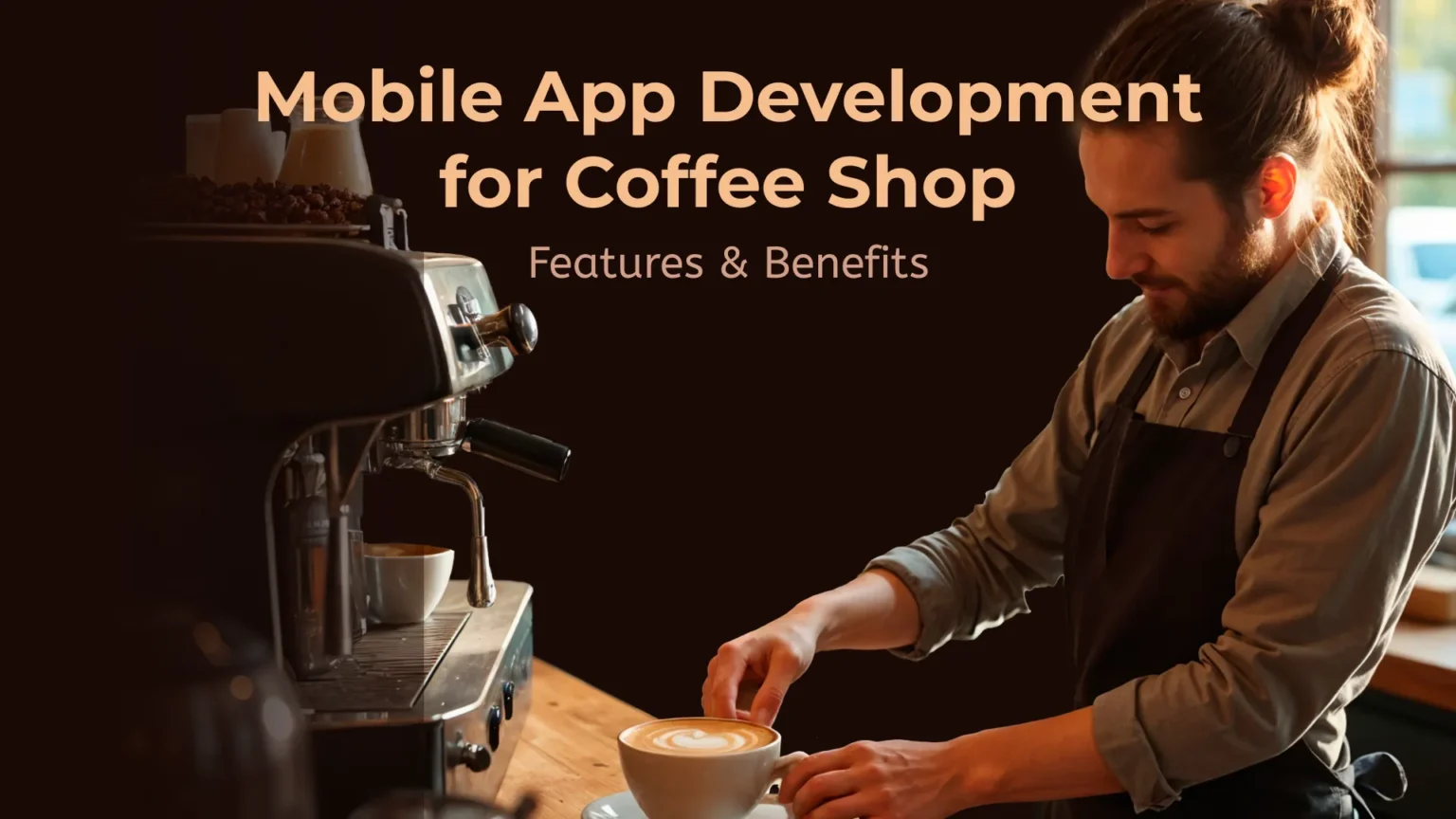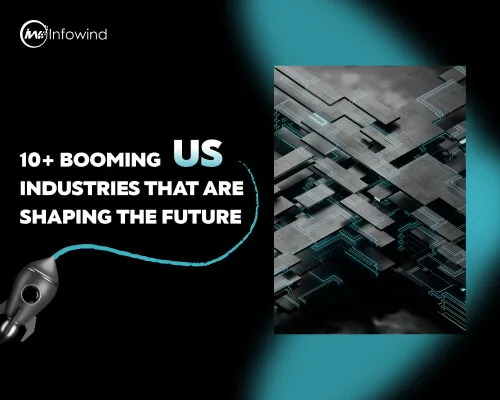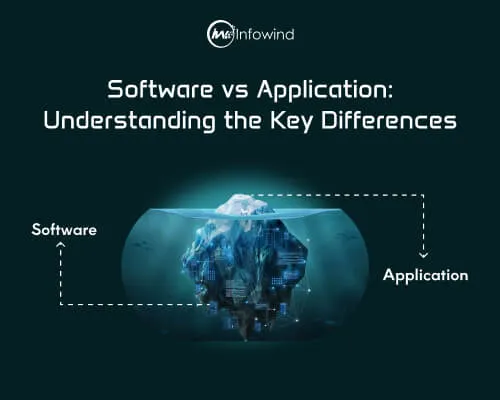Brewing innovation permeates the coffee shop sector because mobile applications continue to grow in popularity. Data reveals that 72% of people choose mobile app use to order and pay at their preferred coffee shops since they value technological ease. The global mobile app market is predicted to reach $613 billion by 2025 based on data from Statista thus businesses from every industry including coffee shops actively benefit from this mobile popularity.

Modern coffee shop operations depend on mobile apps as a mandatory business tool. Mobile applications enrich the customer experience by enabling functions that include pre-ordering systems combined with easy payment mechanisms together with customized loyalty benefits. Customers who join loyalty programs through apps show increased spending habits of 67% over non-members according to research findings thus proving mobile rewards to be effective sales drivers.
A mobile app delivers process optimization abilities in addition to offering quick service. Through real-time analytics, owners achieve better customer tracking, which enables them to improve their menus and target marketing which increases business returns. A customized app in market competition boosts customer retention and brand loyalty for businesses.
A mobile application investment supports contemporary consumer demands by granting coffee shops market superiority which leads to sustained growth and sales improvement.
Why Do Coffee Shops Need a Mobile App?
The food and beverage industry is going through digital changes mobile applications make food ordering more convenient while promoting business expansion. A PYMNTS report indicates that mobile ordering now surpasses traditional in-person food and beverage requests because almost half of consumers opt for mobile ordering. Mobile applications now represent a fundamental transformation of the coffee shop sector which requires all businesses to adopt them for success.
The Rise of Mobile Ordering in Cafés
Modern customers expect a contactless service with quick transactions which drove mobile ordering to become a basic requirement. The implementation of pre-order and pay mobile app features by Square resulted in a 23% increase of sales for participating cafes. Mobile app usage enables customers to bypass queues at coffee shops while owners achieve improved accuracy and expanded operational speed which results in better operational efficiency.
Statistics on Mobile App Usage in Coffee Shops
The practice of accepting mobile app solutions extends beyond exclusive use by major companies. Business of Apps reports that eighty percent of major coffee chains operate mobile programs which provide functions for mobile payments and loyalty programs and customized deals. All kinds of coffee shops are adopting mobile application solutions right now. Cafes which create mobile applications for their brand retain 25% more customers because consumers enjoy receiving limited-time deals accessible only through the app.
Case Studies: Starbucks & Costa Coffee
Starbucks and Costa Coffee among other industry leaders conquered their market segments by deploying mobile apps. Starbucks’ app, with over 31 million users in the U.S. alone, accounts for nearly 30% of its total transactions. Through its loyalty program and mobile ordering system Starbucks enhances customer loyalty as well as boosts spending behaviors.
The introduction of its mobile application by Costa Coffee resulted in a 16% rise in its sales numbers. The app’s payment and rewards management features combined with contactless features delivered convenience to consumers alongside multiple returns to their shops.
Modern business strategy demands that coffee shop owners develop mobile applications because it enhances customer satisfaction and revenue generation while fostering customer loyalty.
Essential Features of a Coffee Shop Mobile App
1. User-Friendly Interface
The intuitive design alongside attractive appearance of the coffee shop app will lead to a superior user experience. The user experience becomes more pleasing because there are easy-to-navigate menus along with short click paths for placing orders. A tidy design structure helps users find app features effortlessly so they can enjoy utilizing the application without the hassle.
2. Online Ordering & Pre-Payment
The technology of mobile apps enables customers to preorder and pay before their visit thus shortening how much time they need to wait and optimizing operational tasks. Committed customers can utilize this benefit to bypass long lines because they have paid in advance for their coffee selection. Mobile pre-ordering available through businesses results in sales growth that reaches up to 30% as reported by Statista.
3. Loyalty & Rewards Program
The implementation of digital loyalty cards and reward programs provides benefits that encourage customers to frequent the establishment again. The implementation of exclusive app discounts and drink rewards after purchase accumulation helps increase customer loyalty to coffee shops. The customer acquisition figures demonstrate that members of loyalty programs spend 67% more than individuals who do not belong to such schemes thereby generating revenue for the business.
4. Push Notifications & Personalized Offers
Services that use push notification capabilities maintain customer involvement by providing specific promotion deals together with discount offers and purchase reminder alerts. Through “Happy Hour” deals and drink discounts clients naturally buy items without any planning.
5. GPS-Based Store Locator
The GPS store locator function enables users to find branches near their location so they can easily satisfy their coffee longing at any time. GPS location assistance helps businesses with many stores locate their places in real-time.
6. Menu Display with Customization Options
The full menu presentation coupled with menu customization options enables better customer contentment. The application becomes more user-friendly as well as more appealing because of its personalized features.
7. Mobile Wallet & Payment Integration
Customers can experience quick checkouts because your platform supports payment methods which include Apple Pay as well as Google Pay and traditional credit cards. Customers trust payment systems that require one secure tap while shopping which results in improved overall shopping quality.
8. Table Reservation & Pickup Scheduling
Members who can schedule both tables and pickups receive better convenience with shorter waiting periods. Customers who want to bypass crowds and save their desired time can benefit significantly from this feature.
9. In-App Feedback & Ratings
Customers can give ratings of their experience through an integrated feedback system that also supports the sharing of suggestions. Feedback functionality gives meaningful information to enhance operations while demonstrating to customers their input counts as a way to build loyal relationships.
10. Social Media Integration & Referral Program
Customers will find it convenient to share their coffee shop encounters through social media connections which makes them more likely to promote the business. The referral program gives customers discounts or free drinks for bringing their friends which results in natural customer acquisition through word-of-mouth marketing.
Benefits of a Mobile App for Coffee Shops
Increased Customer Engagement & Retention
An application for coffee shops provides businesses with superior capabilities to strengthen customer relationships which generates enduring loyalty. Through their apps businesses maintain their customer base by offering loyalty programs combined with customized price cuts along with system alerts. Frequent announcements about menu section additions along with special offers and exclusive deals motivate customers to visit the business frequently. The use of mobile loyalty programs in businesses leads to better customer retention rates of 40% according to App Annie data.
Faster & Convenient Ordering
Through mobile applications, customers can order in advance and pay in advance so their transactions become faster with additional convenience. Customers who make their orders in advance can bypass waiting in queues thus reducing wait times throughout high-demand hours. Pre-ordering options enable customers to complete their orders without staff involvement by paying instantly giving staff members more time for order preparation. The results are improved service efficiency and satisfied customers.
Boost in Sales & Revenue
The revenue potential of coffee shops is heightened by using promotional features and exclusive offers available in their interfaces and selling additional products. Coffee shops enhance user spending by presenting the option “Would you like to add a pastry for $1?” during checkout encourages higher spending. Mobile application ordering platforms from Square enable businesses to grow their sales by 23 percent.
Better Customer Insights & Personalization
The primary benefit of mobile app development for coffee shops includes obtaining useful information about their customers. The apps record user purchasing patterns alongside chosen preferences together with repeated visit counts for generating targeted promotional content. Through personalized offer delivery coffee shops enhance both customer acquisition and overall satisfaction.
Brand Differentiation & Competitive Edge
The competitive market benefits from branded mobile applications which help define your coffee shop against other businesses. A branded mobile app allows your business to mark itself as an innovative and consumer-oriented establishment. Your business becomes more appealing to modern customers through mobile services which provides an advanced reputation that outshines competitors who limit themselves to basic service methods.
Operational Efficiency
Mobile apps streamline order management, inventory tracking, and staff workflow. The implementation of mobile apps makes payments and orders automatic which boosts operational speed and cut down human errors. Through real-time analytics coffee shop owners can make data-based decisions for menu improvements and workforce management decisions as well as promotional campaigns which results in enhanced business success.
Steps to Develop a Coffee Shop Mobile App
Step 1: Market Research & Competitor Analysis
All coffee shop mobile app development efforts require complete market research as the first step. Determine who makes up your intended audience together with their coffee ordering preferences and their main concerns while placing orders. Research and study the successful features of mobile applications operated by Starbucks, Costa Coffee, and local coffee shops. Research analysis will allow you to create a special value proposition while selecting the vital features that customers want to use.
Step 2: Define Core Features & Functionality
The next step involves establishing the essential functions that must exist in the app.
Producing your application needs list requires an overview of essential features using research results. Essentials include:
- User-friendly interface with seamless navigation.
- Online ordering & pre-payment for faster service.
- Loyalty programs and personalized rewards.
- The app delivers push notifications about promotional deals and delivers updates regarding ordered products.
- GPS-based store locator for nearby branches.
The development process should emphasize features that make the application user-friendly and increase customer interaction.
Step 3: Choose the Right Development Approach
Organizations need to make essential decisions regarding their development path because this selection matters.
- Native applications that develop individual versions for iOS and Android deliver enhanced performance and user-friendly functions at a significant time and financial cost.
- Applications built from a unified codebase for iOS and Android development become more economical but reduce development time.
- Businesses that focus on rapid deployment while working with restricted budgets should choose no-code or low-code platforms although these solutions might not provide personalized features.
- Select a strategy that matches your organizational targets and future expansion criteria as well as funding resources.
Step 4: UI/UX Design for a Seamless Experience
A user-friendly design of both interface and user experience serves as the essential factor for maintaining user attraction and retention. Focus on:
- Minimalist design with clear calls to action.
- Smooth navigation and fast loading times.
- Easy access to menu customization, payments, and loyalty programs.
- The visual presentation together with user-friendly features take priority when designing interfaces.
Step 5: Development & Testing Phase
The project development phase can begin after reaching a final design stage. Ensure your app is:
- The system operates with enhanced security and speed together with optimized backend procedures.
- The system supports various payment gateway options including Apple Pay, Google Pay as well as credit cards.
- Fully functional on both iOS and Android platforms.
- A thorough bug search and fix process should occur before releasing the application to maintain a smooth user experience.
Step 6: Launch & App Store Optimization (ASO)
You must launch your app after conducting the development and testing phases. To maximize visibility:
- Both the title and description should contain appropriate keywords (“coffee ordering app”) when you launch your app.
- High-quality screenshots of the app’s features need to be added during this stage.
- A well-written app store description should emphasize how faster ordering works together with special rewards benefits.
Quality app store optimization enhances app finding and leads to increased download numbers.
Step 7: Marketing & Continuous Updates
The promotion of the app after launch requires:
- Social media campaigns and in-store promotions.
- Customers can only access exclusive discounts through the app to increase downloads.
- Email promotion serves to activate customer engagement with current customer bases.
Your application should receive regular updates through customer feedback which enables you to integrate new functionality while enhancing the system performance for market competitiveness.
Cost of Developing a Coffee Shop Mobile App
An estimated breakdown of the app cost depends on its featured capabilities alongside complexity levels.
The expense of building mobile applications for coffee venues depends heavily on the number of features in addition to the application’s complexity along with the development methods used. Here’s a general breakdown:
Basic App ($10,000 – $25,000)
- Simple design with basic features (menu display, online ordering, and payments)
- Suitable for small, independent coffee shops.
Mid-Level App ($25,000 – $50,000)
- The mobile application includes three core capabilities: loyalty programs, push notifications as well as basic analytics.
- Integration with payment gateways like Apple Pay or Google Pay.
- This platform suits growing coffee businesses that desire to keep existing customers.
Advanced App ($50,000 – $100,000+)
- Feature-rich with GPS locators, in-app feedback, customization, and robust analytics.
- Seamless third-party integrations (CRM, POS systems).
- The solution fits medium to large-scale chains seeking a detailed and expandable system.
Factors Influencing Development Costs
Several elements determine the complete cost of developing applications.
Custom vs. Template-Based App:
- The development of customized apps from raw materials provides organizations with collectible branding solutions yet entails price inflation.
- App developers who select template-based apps benefit from using pre-built frameworks since this option provides cost-effectiveness but limited customization potential.
Development Platform:
- Applications that undergo separate development for Android and IOS platforms will cost more and perform better.
- Cost-effectiveness exists with hybrid apps yet they have limitations when it comes to platform-specific features.
Third-Party Integrations:
- Developing payment gateway integration and GPS tracking as well as implementing CRM systems results in higher development expenses.
- The integration process becomes longer and requires personnel with advanced skills when dealing with complex configurations.
Ongoing Maintenance & Marketing Costs
Optimal success for an app depends heavily on both continuous maintenance work and marketing initiatives.
Maintenance Costs:
- For each year of operation the expenses for fixing bugs and providing software updates along with security fixes will equal 15 to 20 percent of the project’s first development budget.
- Extra money will be needed for both feature enhancements and interface upgrades.
Marketing Costs:
To improve the visibility of your application both on Google Play and Apple Store utilize App Store Optimization (ASO).
- Companies spend between $1,000 and $5,000 as well as more per month on various social media advertisement options together with influencer endorsements and shop-based marketing initiatives.
- Business repeatability increases through push notification system and email marketing which maintains user engagement.
- The adoption of mobile apps for coffee shops means long-term financial commitment with both upfront development expenses and ongoing maintenance expenses which build customer faith and generate elevated financial profit.
Choosing the Right App Development Partner
Five qualities exist that should be present in the development company being evaluated.
The selection process for a mobile development partner in the coffee shop sector requires a thorough evaluation of their relevant expertise together with their professionalism. A development company must demonstrate skills which include:
Industry Experience:
- Your business needs a company that has established itself as an expert in food and beverage application development.
- Examine their already completed projects using their portfolio for quality and functionality verification.
Technical Expertise:
- The development team needs to excel in performing iOS development in addition to Android development and cross-platform development.
- Companies must have expertise in integrating third-party solutions among payment gateways and GPS locators as well as loyalty systems.
UI/UX Design Skills:
- Your search should focus on a development team able to build interfaces that are both usable and good-looking as well as user-friendly.
- Outstanding design helps increase customer satisfaction while retaining them as clients.
Post-Launch Support & Maintenance:
- A trustworthy development company provides post-launch assistance which involves managing application improvements addressing problems and upgrading the system.
- The team should offer scheduled maintenance services to preserve application efficiency.
Questions to Ask Before Hiring an App Development Agency
Organizations should examine these inquiries before selecting an agency to verify their compatibility:
- The agency has experience in creating applications dedicated to coffee shops and food businesses.
- What is your development process? (Agile, Waterfall, etc.)
- Please share your work with examples of previous projects together with references from your clients.
- You need to learn about the exact approach your agency uses for app store optimization (ASO).
- What period and project budget do you need to execute this large project?
- Your company provides post-launch assistance together with system maintenance support, do you?
These inquiries assist you in examining their technical abilities together with their reliability for fulfilling business targets.
In-House vs. Outsourced Development
Deciding between internal or external development should include these factors.
In-House Development:
Pros:
- Full control over the development process.
- Easier collaboration with the internal team.
Cons:
- The development costs increase because of expenses for personnel payments and employee benefits and the establishment of necessary infrastructure.
- The model demands recruiting developers while also handling the management responsibilities for them.
- Large coffee chains having continuous app requirements and the capacity to build internally should use this option.
Outsourced Development:
Pros:
- Cost-effective with access to a larger talent pool.
- Faster time-to-market with experienced teams.
Cons:
- Less direct oversight of the development process.
- Phone and messaging communication may face difficulties when the partner works in an alternate time zone.
- Small to medium coffee shops can benefit most from outsourcing their development needs to obtain affordable and scalable solutions.
Specialized development agencies remain the optimal choice to provide services for most coffee shops. The combination of expert knowledge and rapid delivery with cost-effective solutions enables you to operate your business since experienced tech professionals manage development work.
Future Trends in Coffee Shop Mobile Apps
AI-Powered Recommendations & Chatbots
The mobile app development of coffee shops receives transformation through artificial intelligence (AI) technology by delivering advanced personalization and improved customer service.
The mobile application suggests a caramel latte to users who previously selected sweet beverages during their previous purchases.
Through AI-based interactive chatbots customers can obtain quick support that addresses frequently asked questions in addition to helping users modify their orders. The system offers round-the-clock customer assistance which functions autonomously and thus leads to both high efficiency and better customer satisfaction.
Augmented Reality (AR) Menus and Immersive Experiences
AR transforms coffee shop interactions through different immersive approaches which provide customers with interactive features.
- The AR Menus allow customers to use their smartphones to view 3D interactive menu items which enhances their ordering experience.
- Leading brands utilize AR technology to develop special loyalty encounters which include both virtual treasure hunts and interactive storylines that lead buyers to obtain the app and return to play games and visit shops again.
- Through AR technology customers could preview latte art designs for their orders and customize their coffee art via a creative experience.
Blockchain-Based Loyalty Programs and Cryptocurrency Payments
The use of blockchain technology transforms traditional programs to encourage customer loyalty along with payment processes.
- Through Blockchain technology, customers can achieve both secure and transparent reward systems that provide accurate and unmodifiable rewards.
- The emerging cryptocurrency market enables coffee shops to offer their customers the option to buy using Bitcoin and other cryptocurrencies such as Ethereum and stablecoins through mobile applications. The system provides both quick payment processes that span borders along with features suitable for customers who prefer technological solutions.
- NFT Loyalty Rewards represent new brand initiatives that allow customer loyalty through exclusive tradeable digital collectibles obtained through buying from these brands.
IoT-Enabled Smart Coffee Ordering
Through Internet of Things (IoT) implementation customers can now experience fully automated coffee services.
- The connectivity of IoT uses smart coffee machines enabling customers to control their coffee brewing preferences through smartphone applications.
- Through the implementation of automatic ordering and subscription systems the applications will place reorders of coffee beans and supplies before inventory reaches minimum levels thus benefitting both shop owners and their customers.
- Customers receive push notifications and auto-order prompts through IoT geographical fencing technology that triggers nearby the shop to promote last-minute purchases.
The implementation of these futuristic changes enables coffee shops to deliver improved customer satisfaction build long-lasting customer loyalty and gain a market leadership position in the quickly evolving industry.
Conclusion
The current technology-dominated era transforms mobile app development from a top option to an absolute business necessity for coffee shops. A mobile application provides customers with streamlined ordering processes together with customized rewards AI-driven suggestions and secure payment solutions which creates better convenience increases revenue and strengthens customer loyalty to the brand. The powerful move of building mobile applications proves to be an effective method for industry leaders including Starbucks along Costa Coffee to maintain their competitive edge.
Business owners in the coffee shop industry should actively accept the digital transformation that is currently needed. Your business will secure devoted customers who make repeat visits when you create special mobile deals and simple transactions as well as reward membership options. The time has come for your business to create a futuristic user-friendly app that will guarantee lasting success.
Ready to take the next step? The expert developers at Infowind Technologies deliver bespoke app development services with scalable coffee shop solutions to both commercial and administrative clients. The Food & Restaurant Solutions section demonstrates how we assist beverage and food enterprises to grow with digital solutions.
We will achieve success through application downloads which we begin now.






